Iran Foreign Minister In Lebanon To Consolidate Relations
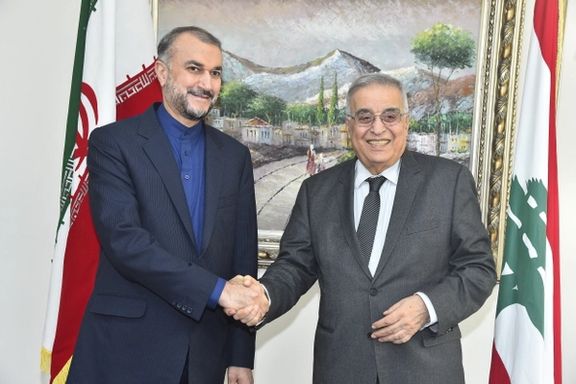
Iran’s foreign minister has traveled to Lebanon to discuss developments in the Middle East region and bolster relations with senior Lebanese authorities.

Iran’s foreign minister has traveled to Lebanon to discuss developments in the Middle East region and bolster relations with senior Lebanese authorities.
Hossein Amir-Abdollahian said that while “mixed messages” had been received from Riyadh, Iran expected “the Saudis will act in the interest of the region.” There has been recent speculation that Saudi Arabia may restore diplomatic relations with Lebanon, broken off in October.
Saudi-Iran tensions have often played out in Lebanon, which has a substantial population of both Sunni and Shia Muslims. Earlier this month Iran suspended bilateral talks after Saudi Arabia beheaded 81 men, including seven Yemenis and a Syrian, for “heinous crimes.” Forty-one were Saudi Shiites, Human Rights Watch reported, apparently sentenced over protests.
On arrival at the airport, Amir-Abdollahian told reporters he had met Lebanese Prime Minister Najib Mikati on the side-lines of the 58th Munich Security Conference a month ago, and expressed “Iran's readiness to establish two 1,000-megawatt power stations in Lebanon and to fully develop trade and economic cooperation...”
Lebanon suffers from chronic power shortage, one consequence of a financial crisis that erupted in late 2020, plunging 80 percent of the population into poverty, following the failure of post-war governments to control a spiraling debt financed by Lebanese banks.
Amir-Abdollahian is due to meet President Michel Aoun, Parliament Speaker Nabih Berri, Prime Minister Najib Mikati, and Foreign Minister Abdallah Bou Habib. The foreign minister called consultations with Lebanon, where officials hail from a range of sects, “regular and constructive.”
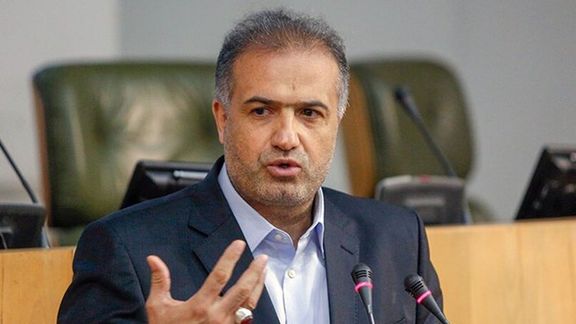
Iran’s envoy to Russia has said the two countries are in talks over the possible recognition of the Russian payment system MIR, according to Iranian media.
The reports that quoted Ambassador Kazem Jalali as making the announcement have not provided further details.
MIR is a payment system for electronic fund transfers that was established by the Central Bank of Russia in 2017 following the imposition of international sanctions on the country starting in 2014.
MIR does not itself issue cards, extend credit or set rates and fees for consumers. Instead, it provides financial institutions with MIR-branded payment products that they can use to offer services to their customers. The system is currently operational in Russia, Armenia, Turkey, and the United Arab Emirates.
The Central Bank of Russia has also developed a domestic financial-communications platform, the System for Transfer of Financial Messages (SPFS), as an alternative to the global Society for Worldwide Interbank Financial Telecommunication (SWIFT) network.
Following Russia’s invasion of Ukraine, several major Russian banks have been cut from the SWIFT system.
According to Iran's Fars News Agency, more than half of Russians are said to have at least one bank card using MIR and over 25 percent of their financial transactions are done through the system.
Iran and Russia are both under US economic sanctions that are causing major problems for their banking sectors. It is not clear if adopting Russia’s MIR and SPFS platforms could help Iran become less dependent on the international banking system.
Tehran is also keen to sign a long-term cooperation agreement with Moscow. During a visit to Moscow in January, Iranian President Ebrahim Raisi presented the draft of a 20-year cooperation deal to his Russian counterpart, Vladimir Putin, that would update a 2001 version.
Tehran claims it is not taking anyone's side in the four-week war between Russia and Ukraine and has called for a peaceful settlement. However, Iran’s state media and hardliner outlets carefully avoid describing Russia’s military offensive in Ukraine as an “invasion.”
In a commentary on Thursday, the official news agency IRNA said that Iran “is against both the expansion of NATO and interferences of the West in the relations between the two neighbors.”
“It also does not consider war to be a solution for problems that exist between countries and urges all sides to refrain from violence. On the other hand, Iran believes that the Western countries' insistence on using sanctions as a tool [against Russia] is unconstructive and will cause further problems,” the agency said.
“Iran's emphasis on dialogue between the sides can resolve the existing issues and prevent problems in the future," according to IRNA.
Iranian officials, including Raisi and Supreme Leader Ali Khamenei, have consistently supported Russia's invasion of Ukraine, blaming the United States and NATO for provoking Moscow.
Khamenei has also claimed that Ukrainians were not resisting strongly to the Russian invasion "because they did not agree with [their] government." The hardline Kayhan newspaper made a similar allegation this week, referring to Ukraine’s “scarecrow” defense, while international media and experts are impressed with the strong Ukrainian resistance.
In February, Iran was among 35 countries that abstained on a UN General Assembly resolution deploring Russia’s action in Ukraine and calling for an immediate withdrawal of its forces from the country.
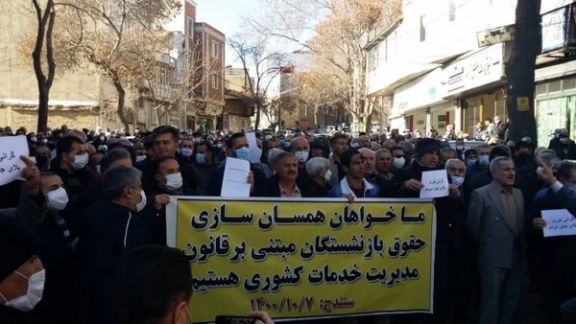
Prices in Iran have risen five to ten-fold since 2018, impoverishing tens of millions and widening income gaps, the head of construction workers' union says.
Cumulative inflation in the construction industry has been 700 percent, while wages for workers has maybe doubled, Akbar Shokat the national chairman of construction workers unions told the Iranian Labour News Agency (ILNA) this week.
Shokat said while each square meter of building construction cost 10 million rials three years ago, now it costs 70-80 million. The same applies to food workers have to buy. One kilo of red meat cost 250 rials in 2018 while now the price has reached 1.6 million rials.
The examples mentioned by the union leader clearly show the impact of ‘maximum pressure’ sanctions imposed by the United States after former President Donald Trump withdrew from the Iran nuclear accord in May 2018. It also shows that inflationary pressures picked up as time passed, averaging above 40 percent in 2021.
While with US sanctions Iran’s currency nosedived in 2018, it took months for annual inflation to increase to above 30 and then 40 percent. The currency, rial dropped from 33,000 to the dollar to the current low of 260,000, or almost eightfold.
The claim about people with capital getting richer is based on the reality that business owners raise prices as the value of Iranian currency falls and maintain a higher margin of incomes than wage earners whose salaries change once a year by a government decision on minimum wage. Salary increases are always far less than inflation.
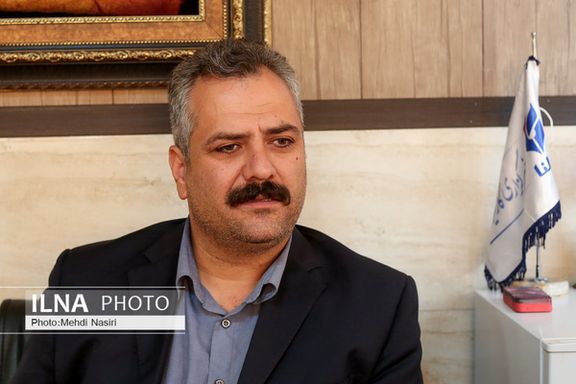
With the most recent minimum wage hike, an average worker will take home around $200 a month, while labor groups say the minimum needed for a family of 3.3 persons is $450 a month.
People owning real estate, profitable businesses or foreign currencies are by-and-large immune from the perils of a falling currency and inflation, because the value of their capital remains mostly intact. For example, real estate prices calculated in US dollars, have stayed the same since 2018, while salaries have dropped.
Jalal Mirzaee, a former member of parliament, told ILNA on Thursday that without the removal of US sanctions the economy cannot improve, especially that President Ebrahim Raisi in many cases has appointed top managers who are not experts in their fields.
Raisi, for example, has appointed former Revolutionary Guard commander Mohsen Rezaei as one of his top economic aides, but he has never managed a large bureaucracy or a private sector company.
“The root cause of many economic difficulties is US sanctions,” Mirzaee said, but added that this does not mean successive governments have not mismanaged the economy, which is largely state-owned and run by the government. If sanctions are lifted, it would be easier to address Iran’s economic problems, but that would depend on effective management by the government, Mirzaee said, which is doubtful in the current administration.
Hossein Raghfar, a respected economist, told Etemed Online this week that the country’s foreign currency revenues have been mishandled and the rial has fallen so much that economic stability is questionable. The result is capital flight, with most investors shifting their businesses to neighboring countries.
Raghfar criticized the established economic order, saying that the Islamic Republic has created an “oligarchy that benefits most from foreign currency revenues” gained by exporting crude oil and other national resources. He argued that in the first instance, political insiders and the military should exit the business world and allow a real private sector to emerge. Raghfar said, “If there is no private sector, the economy cannot move forward.”
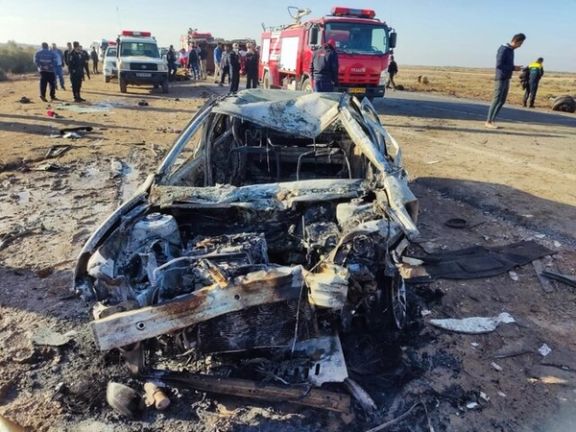
Iran’s traffic police chief has criticized manufacturers for importing car parts from China, saying there is no effective quality control.
Brigadier General Kamal Hadianfar told Hamshahri Online in an interview Wednesday there were no cars with all components built domestically.
“Why do they import parts from China? Who monitors the quality of these Chinese parts?” he asked. Hadianfar said car manufacturers could learn from the self-sufficiency of the defense industry in making “largest ballistic missiles in the region”.
President Ebrahim Raisi said in October that Iran’s military and nuclear sectors had responded to United States with “great achievements” due to motivation and effort. But, Raisi argued “we have not invested the technology of the missile industries in the automotive industry.”
China has been the world’s largest car maker since 2008, with its output since 2009 higher than US, European Union, and Japan combined. China accounts for 29 percent of world car exports with Saudi Arabia its leading market, and two Chinese electric car manufactures listed on the Nasdaq. But quality of Chinese cars is considered poor, with focus on low prices and high production numbers.
Echoing those in Iran who blame low-quality vehicles for road casualties, Hadianfar criticized January domestic automakers for producing "carriages of death."
A deputy of Iran’s traffic police, Sivash Mohebbi, said Thursday that 322 people had died in the previous week.
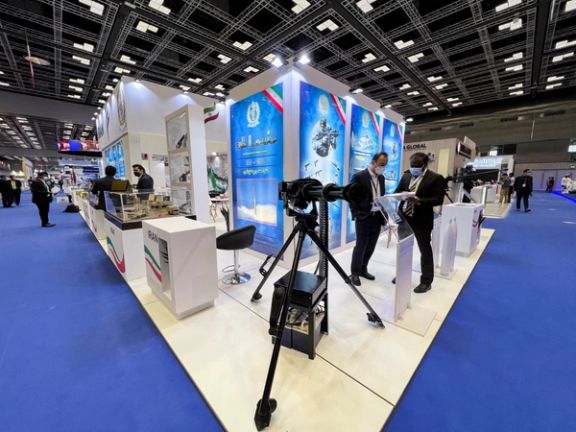
Iran’s participation in a defense show in Qatar has drawn criticism from the United States, as Revolutionary Guard commanders set up shop to showcase weapons.
"We reject the presence of Iran at a maritime defense exhibit, considering that it’s Iran that single-handedly is threatening maritime stability throughout the Gulf region," US State Department spokesperson Ned Price said in a statement.
Their presence was striking when other Sunni Muslim Gulf states and Israel are alarmed at the prospect of the United States removing its terrorist designation of the IRGC as part of efforts to revive a nuclear pact with Iran.
The Iran booth was organized by Iran's Ministry of Defense and the commanders were part of a broader Iranian delegation.
A Qatari official said in a statement to Reuters on Thursday no invitation had been sent to the IRGC.
"The participation in the event and pavilion was by the Iranian Ministry of Defense and there were no invitations sent to Iran’s Revolutionary Guard."
Washington is reportedly considering removing the IRGC from a terrorist organization blacklist in return for Iranian assurances about “de-escalation” in the region.
Qatar's DIMDEX exhibition drew international defense firms hoping to boost sales to wealthy Gulf states that are moving to expand the military capabilities of the energy-producing region.
Qatar has good ties with Iran, with which it shares a giant gas field. In contrast, Qatar's neighbor Saudi Arabia is locked in several proxy conflicts with Tehran, which strives for regional dominance.
With reporting by Reuters
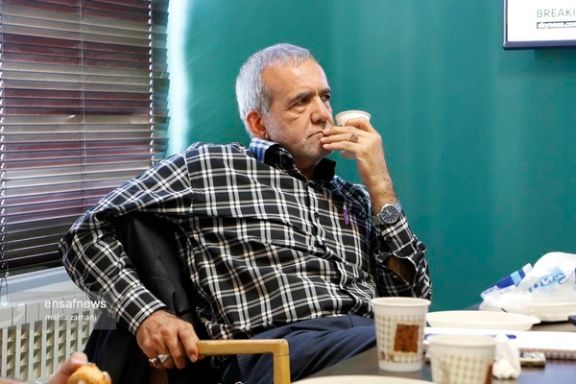
An Iranian lawmaker says many university professors have applied for retirement or are planning to leave the country amid economic hardships.
Reformist member of Parliament from Tabriz Massoud Pezeshkian told ILNA on Wednesday that despite the call by Supreme Leader Ali Khamenei to boost innovation, nothing special will happen in academia until authorities change their views and perspectives.
Khamenei designated the new Iranian calendar year of 1401 (started on March 21) as the year of knowledge-based productivity and job creation.
Khamenei has been designating slogans for each year in the past decade, such as “Leap in Production” and this year his motto became innovation and knowledge based economic growth.
Officials will face an uphill battle implementing this slogan because most of the things that the parliament has approved are not practical or science-based and would further restrict universities in innovation and employment, Pezeshkian noted.
Pezeshkian added that when the parliament, the presidential administration and the judiciary choose private sector contractors for projects, you cannot encourage the academics to stay in the government universities to boost efforts with the same salary.
In addition to all this, universities are also firing many of professors in what critics see as further political cleansing of academia.
Iran’s Azad University has fired 325 professors and lecturers in recent months and has decided to dismiss 1,500 more.